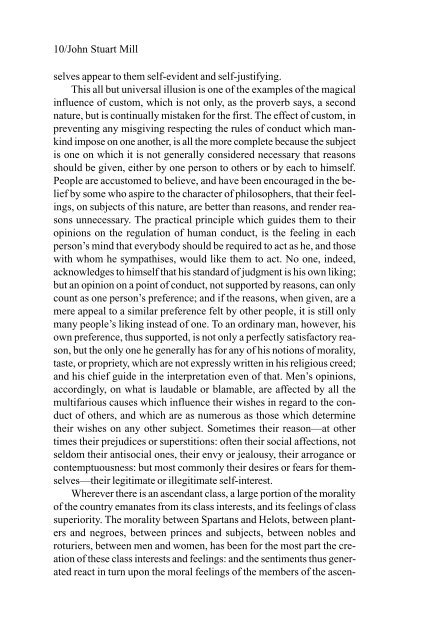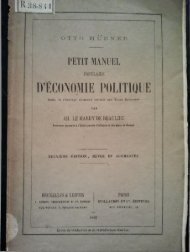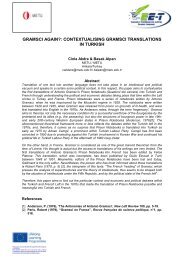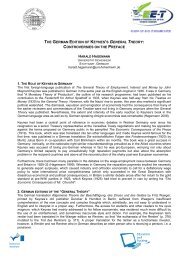On Liberty John Stuart Mill Batoche Books
On Liberty John Stuart Mill Batoche Books
On Liberty John Stuart Mill Batoche Books
You also want an ePaper? Increase the reach of your titles
YUMPU automatically turns print PDFs into web optimized ePapers that Google loves.
10/<strong>John</strong> <strong>Stuart</strong> <strong>Mill</strong>selves appear to them self-evident and self-justifying.This all but universal illusion is one of the examples of the magicalinfluence of custom, which is not only, as the proverb says, a secondnature, but is continually mistaken for the first. The effect of custom, inpreventing any misgiving respecting the rules of conduct which mankindimpose on one another, is all the more complete because the subjectis one on which it is not generally considered necessary that reasonsshould be given, either by one person to others or by each to himself.People are accustomed to believe, and have been encouraged in the beliefby some who aspire to the character of philosophers, that their feelings,on subjects of this nature, are better than reasons, and render reasonsunnecessary. The practical principle which guides them to theiropinions on the regulation of human conduct, is the feeling in eachperson’s mind that everybody should be required to act as he, and thosewith whom he sympathises, would like them to act. No one, indeed,acknowledges to himself that his standard of judgment is his own liking;but an opinion on a point of conduct, not supported by reasons, can onlycount as one person’s preference; and if the reasons, when given, are amere appeal to a similar preference felt by other people, it is still onlymany people’s liking instead of one. To an ordinary man, however, hisown preference, thus supported, is not only a perfectly satisfactory reason,but the only one he generally has for any of his notions of morality,taste, or propriety, which are not expressly written in his religious creed;and his chief guide in the interpretation even of that. Men’s opinions,accordingly, on what is laudable or blamable, are affected by all themultifarious causes which influence their wishes in regard to the conductof others, and which are as numerous as those which determinetheir wishes on any other subject. Sometimes their reason—at othertimes their prejudices or superstitions: often their social affections, notseldom their antisocial ones, their envy or jealousy, their arrogance orcontemptuousness: but most commonly their desires or fears for themselves—theirlegitimate or illegitimate self-interest.Wherever there is an ascendant class, a large portion of the moralityof the country emanates from its class interests, and its feelings of classsuperiority. The morality between Spartans and Helots, between plantersand negroes, between princes and subjects, between nobles androturiers, between men and women, has been for the most part the creationof these class interests and feelings: and the sentiments thus generatedreact in turn upon the moral feelings of the members of the ascen-











